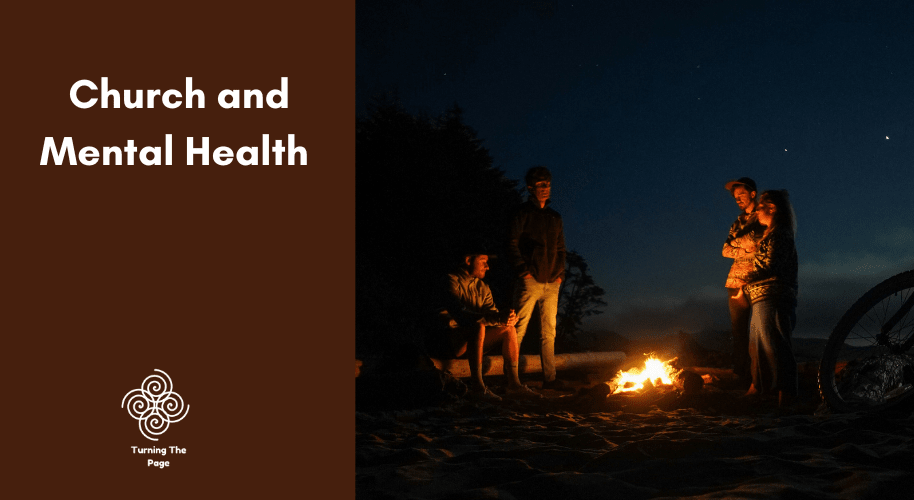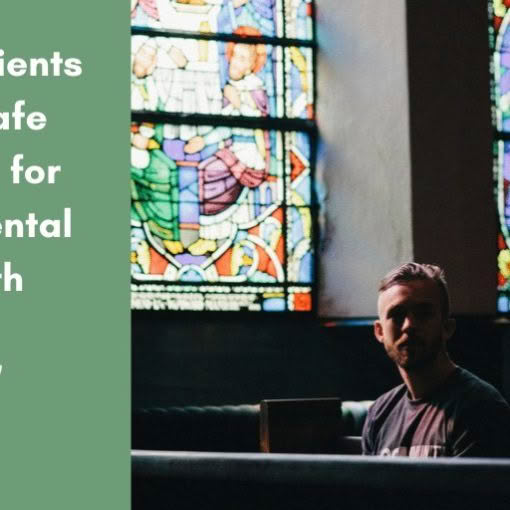We need a place. A church, a nest, a fire of warm burning coals. A place for the growth of mental health. Is it possible?
Trigger alert: This post contains the word ‘Church’ in it. 😊 Please push through.
The story goes that there was once a man who had stopped going to church.
The pastor came and visited.
It was a cold winter night, and there was a fire of red-hot coals ablaze in the hearth. 
As they sat around the fire warming themselves, the pastor grabbed a pair of fire tongs and reached in and took one of the coals out of the fire.
Sitting there on the hearth, the coal slowly lost its glow and grew dark. Wisps of smoke spiralled up and away.
The pastor got the tongs once again and placed the coal back into the fire, and it once again regained its full fiery glow.
The pastor got up to leave, and the man said to him. ‘Thank you for that fiery sermon. I will be back at Church on Sunday’.
The Church of Glowing Coals
I like a couple of aspects of the story.
- The pastor actually took the trouble to visit the man. That someone noticed this man’s absence and took the time to visit.
- The concept of each member warming each other’s spiritual life.
- There is a time and a place where people can come and ‘stir each other up to love and good works’ Hebrews 10:24
Here are a couple of questions, though
- Why did the man stop going to church? Was it burnout? (sorry had to add that one in)
- Is church life all about compliance to attending a meeting?
What I don’t like is how this little story has been used to enforce compliance to a group where there is no desire to know, explore, discover and touch the others coal. Soultalk is secondary to compliance.
Instead, it’s more often about compliance with a set of rules and behaviours. For some I have talked with, the coal has been kicked out of the fire.
Why do people leave the church?
If you want to explore that question, then perhaps read this article A Churchless Faith by a former lecturer of mine, Alan Jamieson, and his book
A Church for the 5%
What sort of church would help someone when they have mental illness struggles such as
- Schizophrenia
- Depression
- Anxiety
- Personality disorders
- Addiction issues
- A history of having been sexually abused
- Cutting and self harm
- PTSD
What if most those in your pastoral care were in some sort of long-term residential care due to mental illness?
How would ‘Church’ need to be to meet their unique needs? (By the way, when you shift your focus to meet the needs of ‘the least of them‘ you will soon discover you will attend to the needs of the most of them)
Statistics tell us that 1:5 people (20%) at anyone time will experience some sort of Mental Unwellness. It might be depression, anxiety, grief, addiction issues, etc.
For most of them, they can get on with life and not be too disabled by their illness.
For some, they may not even know they are unwell.
Digging deeper into statistics, we find that 5% of the population will be experiencing a serious mental health disorder that disrupts work, family, or social life.
Serious mental illness is defined as a mental, behavioral, or emotional disorder resulting in serious functional impairment, which substantially interferes with or limits one or more major life activities. National Institute of Mental Health
So, for every one hundred people, there will be five experiencing a serious mental illness.
It is likely that at some stage in your life you will be part of the 1:5.
You also could become part of the 5:100 group. I was in the 5% for a brief period, and no one came.
No pastor visited me to tend my burnt-out coal.
Church and Mental Health
It seems that when you join the words Church and Mental Health; it becomes yet another add-on in the ministry list.
Churches set up
- a counselling service
- a housing program
- soup kitchens
- a food bank
- a second-hand clothing shop
- a prayer group
- a twelve-step program for addiction
These people (supposedly) need ‘professional help’, so the church program gives it to them.
All nice, neat, keep your hands tidy, and safe. Political correctness and pastoral correctness.
The pastor still preaches sermons that those struggling with attention problems struggle to process.
Music is still pumped up and primped out to satisfy the endorphin kick we addictively crave, yet it’s just too loud and overpowering for many. (By the way, when you hear the words ‘worship was really great’, could it be simply an endorphin hit like you would get in any sort of pop concert? )
A book is sold about ‘The 12 steps of being a successful Christian’, to be read by all the church, yet many can not read a chapter or afford the $25 cost.
Jenny leaves her pew, wanders home, sits alone with her Bible and talks with Jesus.
Church has wandered a long way from the days of a few friends walking a path and Jesus joining them. Luke 24:13-35
The church of gently curious questions
What would it be like if the pastor in the original story came to the man and asked gently curious questions about his soul?
That they both prayed together. They had ‘church’ together around the fire.
They shared a meal and listened deeply to each other. The pastor learning from the man and his struggles. The man learning about the pastor.
That a conversation took place where both were converted into a better way of ‘doing church’
True conversation always puts the conversant’s at risk, because you cannot truly converse without the risk of conversion. Bernard Lee; Michael Cowan
Perhaps the pastor would share in the preaching a kind of lived truth that touched the dying coals of the congregants.
Our great problem is the problem of trafficking in unlived truth.
We try to communicate what we’ve never experienced in our own life. Dwight L Moody
Perhaps the whole of the fire glowed brighter because each coal got to know the deepest needs of the other coals and the coals outside of the fire
Maybe, like those pilgrims heading to Emmaus, they would say “Didn’t our hearts burn within us as he talked with us on the road and explained the Scriptures to us?” Luke 24:13-35
The greatest need
When I started in ministry back in 1998, I read these lines
In recent days, I have made a shift. I am now working toward the day when communities of God’s people, ordinary Christians whose lives regularly intersect, will accomplish most of the good that we now depend on mental health professionals to provide. And they will do it by connecting with each other in ways that only the gospel makes possible.
I envision a community of people who intentionally mingle in settings where these nutrients are passed back and forth, where I pour into you the healing resources within me and you pour into me what God has put in you.
But that’s not what I’m doing. I have strong reason to suspect that Christians sitting dutifully in church congregations, for whom “going to church” means doing a variety of spiritual activities, have been given resources that if released could powerfully heal broken hearts, overcome the damage done by abusive backgrounds, encourage the depressed to courageously move forward, stimulate the lonely to reach out, revitalize discouraged teens and children with new and holy energy, and introduce hope into the lives of the countless people who feel rejected, alone, and useless.
Maybe “going to church,” more than anything else, means relating to several people in your life differently. Maybe the center of Christian community is connecting with a few. Dr. Larry Crabb. Connecting. Healing Ourselves and Our Relationships.
Quotes to consider
- ‘Whom do we listen to and whom do we trust? Trust is essential to listening. Why do we believe the myth that the poor people don’t know anything and can’t be trusted? Where do you really find more truth about society – at the top or the bottom? Are the best solutions conceived in the corridors of power or in the neighbour hoods? Only those willing to stand close enough to listen will ever hear those closest to the problem. Jim Wallis
- People with handicaps teach me that being is more important than doing, the heart is more important than the mind, and caring together is better than caring alone. Henri J.M. Nouwen
- The person who loves their dream of community will destroy community, but the person who loves those around them will create community. Dietrich Bonhoeffer
- A one-way relationship isn’t really a relationship at all. It’s exploitation. Sonia Simone
Questions to answer
- Why do you think people leave the church?
- Why do people not want to be part of the church?
- What would a church that has a focus purely on those with a serious mental illness do?
Formation exercise
- Think of those who are struggling with a serious mental illness. Those in the 5%. How would you give them soultalk, spiritual direction, pastoral care? How would you create a warm and inviting place where they could share the energy contained within their coal? Is this threatening to you?
Further reading
Contact me





